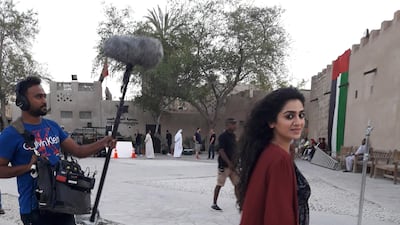The UAE's small, but growing, library of independent feature films is set to receive a new offering on December 6, when Shazia Ali Khan's Pinky Memsaab releases in Vox Cinemas across the region, as well as in Pakistan the following day.
Pinky Memsaab is the tale of a young Pakistani maid who comes to Dubai from her Punjabi village, and how her life becomes intertwined with that of the Pakistani-British socialite woman of the house she is working in. Director Ali Khan conceived the idea when she first moved to Dubai around three years ago, following a not-entirely-traditional route into the film industry from her corporate job in Pakistan.
"I was working in the corporate sector and got to see adverts being developed," she explains. “I realised I was more interested in what the camera was doing than what the brand was doing, so I just decided to go back to school and take a film degree in London. I worked there for a few years, then did a stint in South Africa, mostly documentaries. This script was basically just an observation on the different cultures and societies I saw when I moved here.”
With script in hand, Ali Khan admits that she wasn’t really sure what to do next, so she started with the most obvious approach and took it to some Pakistani studios: “They all said it wouldn’t fly. There were no big stars, no big budget, and things tend to be made in a cookie cutter way in the mainstream industry, with x number of songs and so on,” she recalls. “We were just a bunch of people who love cinema and love to experiment with different genres, but that’s not something that really happens in Pakistani cinema, so it was really hard to attract investors.”
Ali Khan fell back on her business background for a new approach, and decided to look at her script as a business opportunity, rather than a cinematic one: “We made a business plan and pitched it to private investors rather than film producers,” she explains. “They looked at our projections, and I think they liked the idea of it being something a bit different to invest in. I guess we just got lucky.”
With two local investors installed as executive producers, Dubai production house Shoot at Sight came on board as line producers thanks to their knowledge of the logistics of shooting and assembling a crew. Such was their passion and dedication to the project, however, that Ali Khan reveals they were soon promoted to producers. It was Shoot on Sight's first feature as a production house, although the company's Fahad Shaikh had previous experience in the field – he's produced a number of documentaries, as well as 2012's record setting The Owner – this multinational feature used no less than 25 directors from all over the world and Shaikh served as both director and co-producer on this collaborative effort.
Shaikh and his partner Umr Khan ran a tight ship, bringing the movie in on budget and on time. The shoot took place mostly in Dubai, with around 20 per cent also taking place in Pakistan, and the edit and post-production were carried out in Dubai and Abu Dhabi. The crew were a multinational team, most of whom were known to Khan and Shaikh from their previous work, while the cast, although not household names, did have some kudos within their own circles, as Ali Khan explains:
“The Indian driver is played by Sunny Hinduja who has done fantastic films in Indian art circles, although he’s not your mainstream SRK type,” she says. “Kiran Malik is a well-known model from Dubai who plays the socialite woman of the house. She’s very well-known in fashion circles, but this is her first movie and she really has talent. Hajra Yamin, who plays the young maid, is well-known in theatre circles both here and in India and Pakistan. There’s a huge Indian following of Pakistani plays, strangely enough, even though they disagree on so many other issues.”
There's one other big star that Ali Khan is keen to give full credit to - the city of Dubai itself: "We really showcase Dubai, it’s one of the stars of the film. We’re not just showing the Burj and the yachts, but the real Dubai you don’t see in the Hollywood films. It’s a true representation - the story, the characters, the Indian chauffeur, the naïve young maid straight off the boat, your high society party people, and the Bur Dubai underside that you don’t often see on screen."
The biggest challenge facing many local film makers is getting their film in front of audiences once the hard work is, theoretically, done, but with Vox on board, that doesn’t seem to be an issue for the team either: “We approached Vox after the film was complete, they weren’t there from the start as the film was totally self-funded thanks to our two executive producers,” Shaikh explains. “We showed them the finished film and they loved it, and the same with the Pakistani distributors we have lined up too.”
Shaikh adds that he hopes to see the film travel beyond these two markets in future too: “We’ve applied to a couple of festivals, although we’re a bit limited because of the public release, and a lot of festivals want premiere rights, so we’re working around that,” he says. “We’re also looking at distribution for other countries. We’ve spoken to Netflix as well as with other broadcasters and satellite companies, there are conversations ongoing. We definitely hope to release it in Europe and elsewhere,but we’ll wait to see what the response is in the UAE and Pakistan first.”
He adds: “The film is around half in English, and half in Urdu or Hindi, so this region is definitely our biggest market. At the same time, though, it’s a universal subject so it definitely could travel. We’ll just have to see how the initial release goes.”

